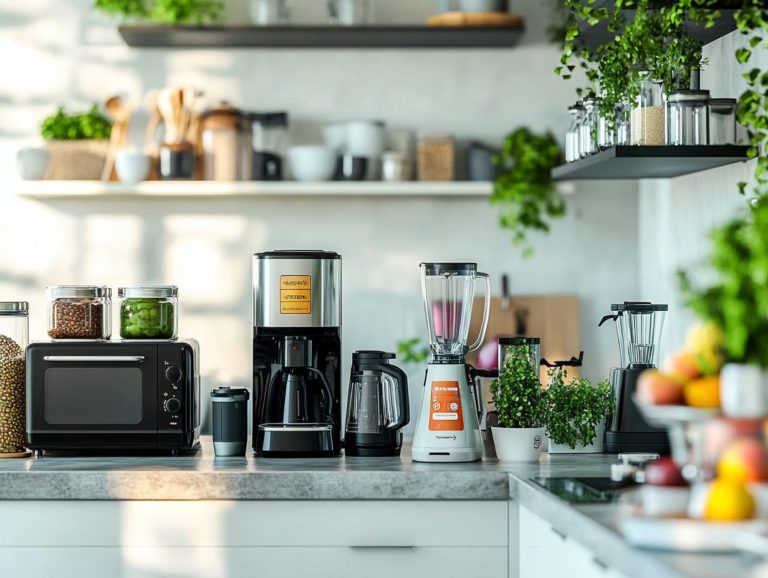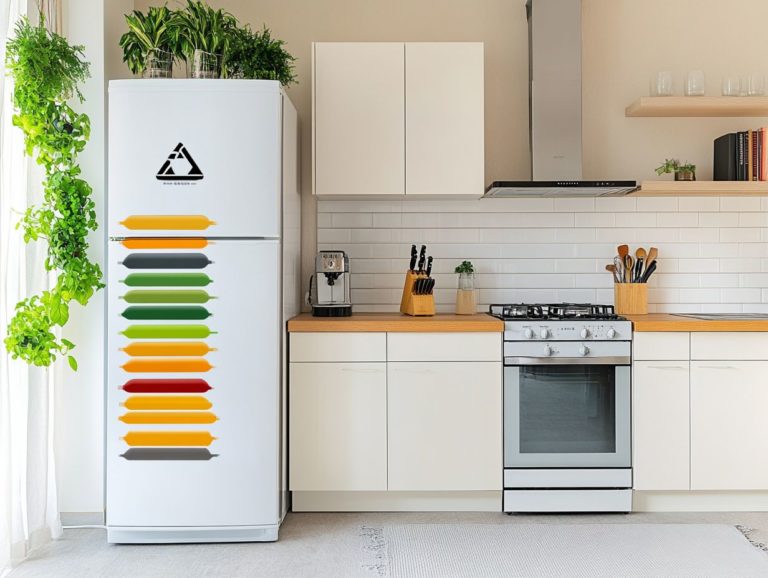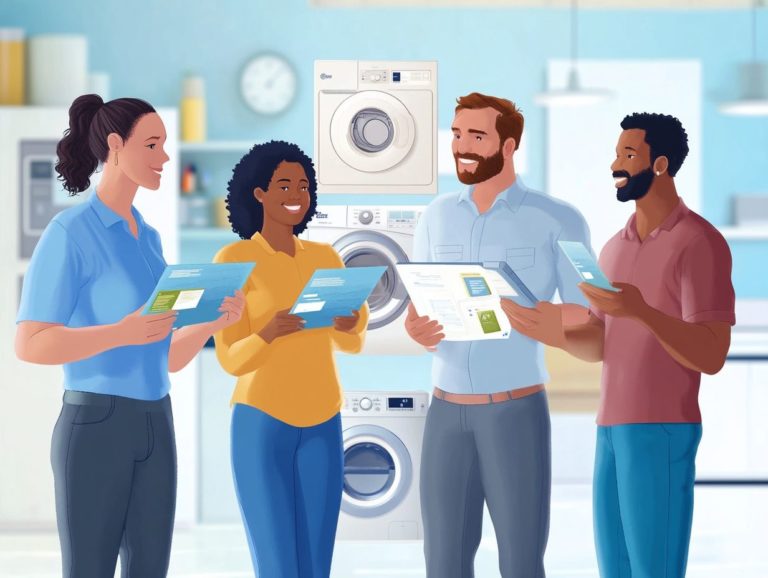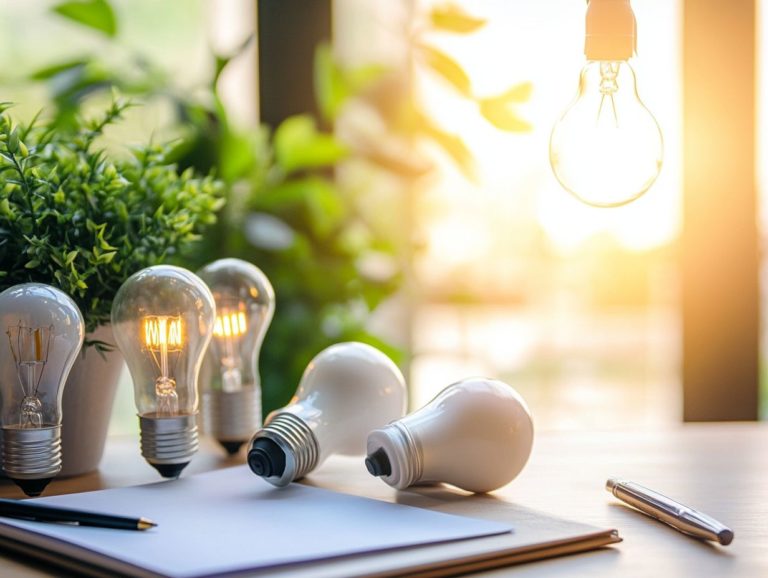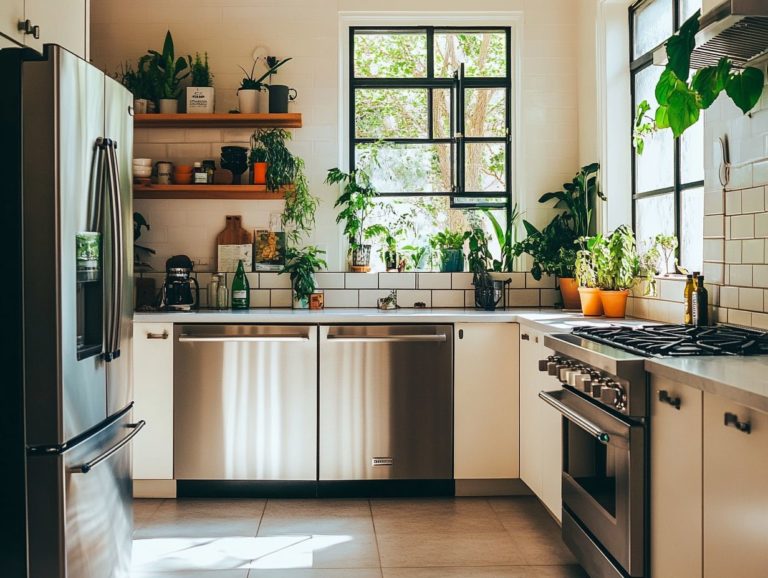How to Upgrade to Energy-Efficient Appliances
Energy efficiency transcends mere buzzwords; it represents a crucial facet of sustainable living, profoundly influencing both your finances and the environment.
This article delves into the essence of energy efficiency and highlights how upgrading to energy-efficient appliances can yield a multitude of advantages. You’ll gain insights into interpreting energy labels and selecting the right products, ensuring your decision-making process is seamless.
Furthermore, uncover the financial incentives available to you, making the transition not only environmentally friendly but also budget-friendly. Start your journey toward a more energy-efficient home that benefits both you and the planet!
Contents
- Key Takeaways:
- What You Need to Know About Energy Efficiency
- How to Choose Energy-Efficient Appliances
- Upgrading to Energy-Efficient Appliances
- Financial Incentives for Energy-Efficient Appliances
- Frequently Asked Questions
- How do I know if it’s time to upgrade to energy-efficient appliances?
- What are the benefits of upgrading to energy-efficient appliances?
- How do I choose the right energy-efficient appliances for my home?
- Are energy-efficient appliances more expensive?
- Can I upgrade to energy-efficient appliances if I live in a rental property?
- What are some other ways to make my home more energy-efficient?
Key Takeaways:
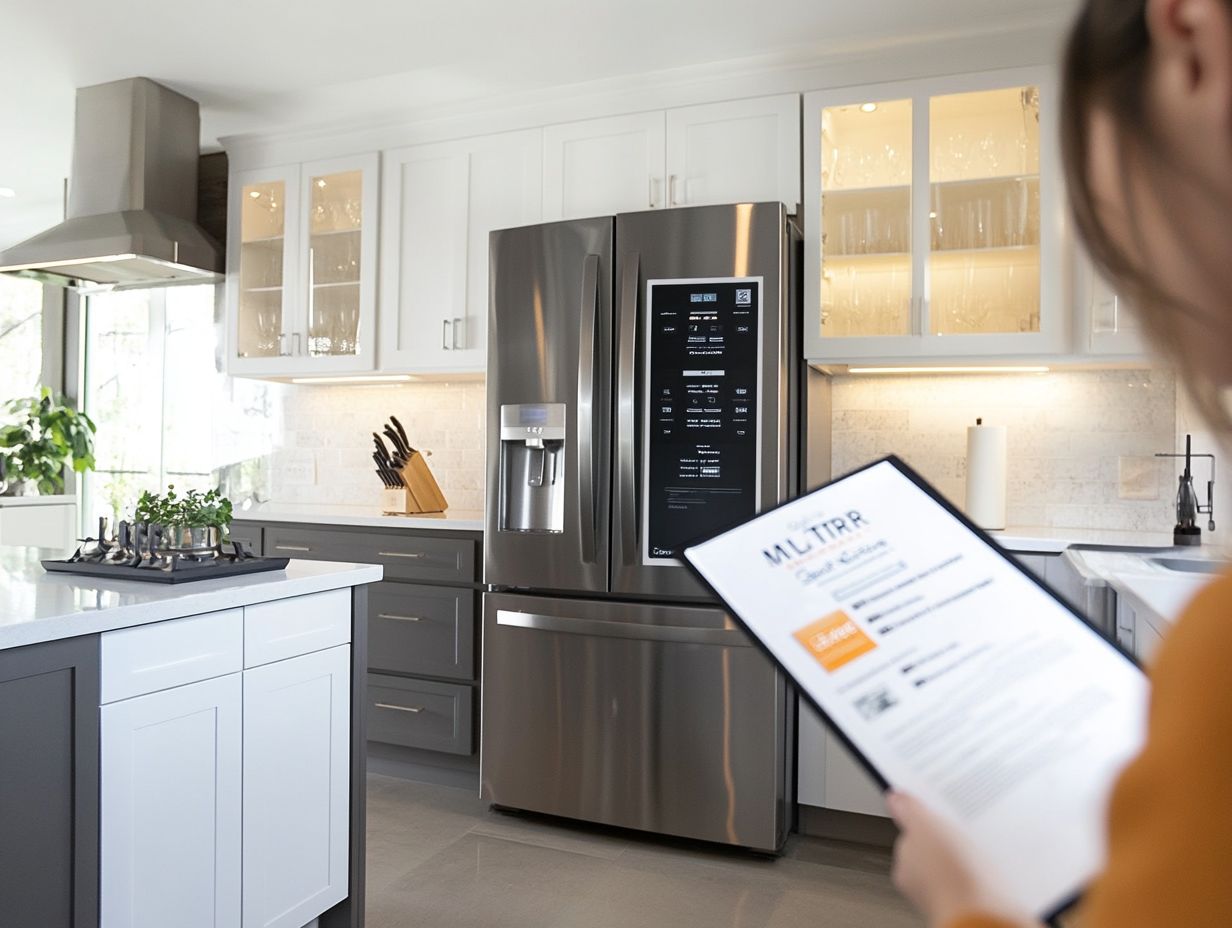
- Save money by reducing energy consumption.
- Lower your utility bills with energy-efficient products.
- Take advantage of government programs and rebates.
- Ensure proper installation and maintenance for maximum savings.
What You Need to Know About Energy Efficiency
Understanding energy efficiency is essential for optimizing your home and slashing energy bills. It involves various methods and tools aimed at minimizing waste while maximizing savings.
By incorporating energy-efficient upgrades like heat pumps and smart thermostats, you can significantly reduce your dependence on fossil fuels. This not only enhances your comfort but also promotes sustainability.
Solutions like attic insulation and high-performance windows contribute to a greener planet and open the door to a variety of rebates and federal tax credits. This is a fantastic chance to invest in technologies that benefit both your wallet and our planet.
What is Energy Efficiency?
Energy efficiency is about using less energy to enjoy the same level of comfort and functionality in your home an approach highly endorsed by the ENERGY STAR program.
This strategy cuts down on energy consumption and lessens the environmental footprint tied to traditional energy sources. With energy costs soaring, it s crucial to embrace energy-efficient practices now.
ENERGY STAR certified products, which adhere to rigorous efficiency standards, are key players in this shift. These products range from appliances and lighting to heating and cooling systems, giving you the chance to lower your utility bills while shrinking your carbon footprint.
By incorporating these solutions, you enhance your comfort and play a part in fostering a more sustainable future, illustrating just how impactful energy efficiency can be on your home s energy consumption.
Benefits of Upgrading to Energy-Efficient Appliances
Upgrading to energy-efficient appliances presents a wealth of advantages, including significant energy savings, lower energy bills, and a reduced carbon footprint, which can make you eligible for various rebates and incentives.
These modern appliances are crafted to consume less energy, leading to decreased utility costs while fostering a healthier planet by minimizing greenhouse gas emissions.
Many utility companies and government programs offer financial incentives such as tax credits and rebates to motivate homeowners like you to make the switch. By investing in energy-efficient models, not only do you save money in the long run, but you also boost your property s value.
Plus, many of these appliances come loaded with advanced technology and features, making them user-friendly and high-performing.
How to Choose Energy-Efficient Appliances
Selecting energy-efficient appliances requires you to grasp the nuances of energy labels and evaluate your unique requirements. Utilize resources such as ENERGY STAR and explore the long-term benefits of energy-efficient appliances to help you make informed choices that maximize both energy savings and performance.
Understanding Energy Labels
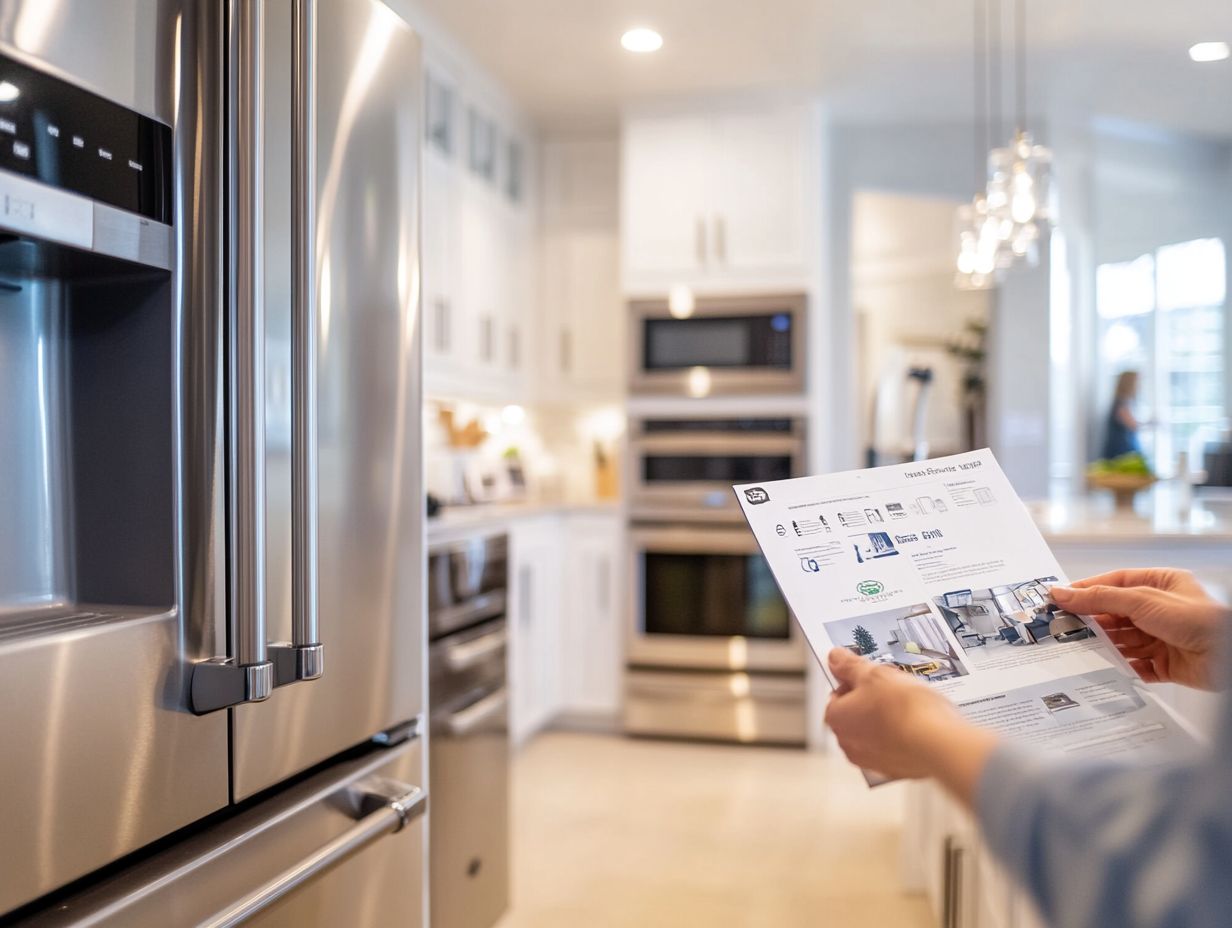
Energy labels are crucial tools that help you make informed choices when shopping for ENERGY STAR certified products. They outline energy consumption and efficiency ratings, making it easy to compare options.
Choosing appliances with high energy efficiency ratings lowers your electricity bills, contributing to substantial savings over time.
By prioritizing ENERGY STAR certified products, you re not just making a smart purchase. You re also contributing to environmental sustainability by following strict energy-saving rules, which help reduce greenhouse gas emissions.
Energy labels empower you to choose smarter, eco-friendly appliances. This allows you to positively impact both your wallet and the planet.
Factors to Consider When Shopping
When shopping for energy-efficient appliances, consider your household’s specific needs and installation requirements. Understanding the size of your space and usage frequency can shape your decisions.
If you have a larger family, you ll need appliances that are both powerful and efficient. Assess the long-term savings potential of these investments as well.
Don t overlook installation. Ensuring proper setup is vital for maximizing efficiency and confirming compatibility with your existing systems can save you time and resources.
Upgrading to Energy-Efficient Appliances
Upgrading to energy-efficient appliances requires a thoughtful approach. For guidance on this process, check out how to upgrade to energy-efficient appliances and replace your old models with sleek, modern versions that are ENERGY STAR certified.
These appliances not only perform better but promise energy savings over the long haul.
Replacing Old Appliances
Replacing your old appliances with energy-efficient models enhances your home’s savings. For those looking to make a significant change, learning how to upgrade to a smart energy-efficient home can be incredibly beneficial, as newer appliances often consume just a fraction of the energy that older ones do.
This shift provides immediate financial relief and helps create a more sustainable environment by cutting carbon emissions. Modern appliances come with features that improve performance and ease of use.
Investing in energy-efficient appliances is a savvy financial decision and a commitment to a healthier planet for future generations.
Tips for Proper Installation and Maintenance
Proper installation and regular maintenance maximize the benefits of energy-efficient appliances. Follow the manufacturer s guidelines closely improper setup can lead to higher energy use.
For example, when installing a smart thermostat, calibrate it to your home s unique heating and cooling needs. Smart technologies can also help you monitor usage and spot irregularities.
Regular upkeep, like cleaning filters or maintaining your refrigerator s coils, is vital for efficiency. These best practices conserve energy and lower utility bills, making your investment worthwhile.
Financial Incentives for Energy-Efficient Appliances
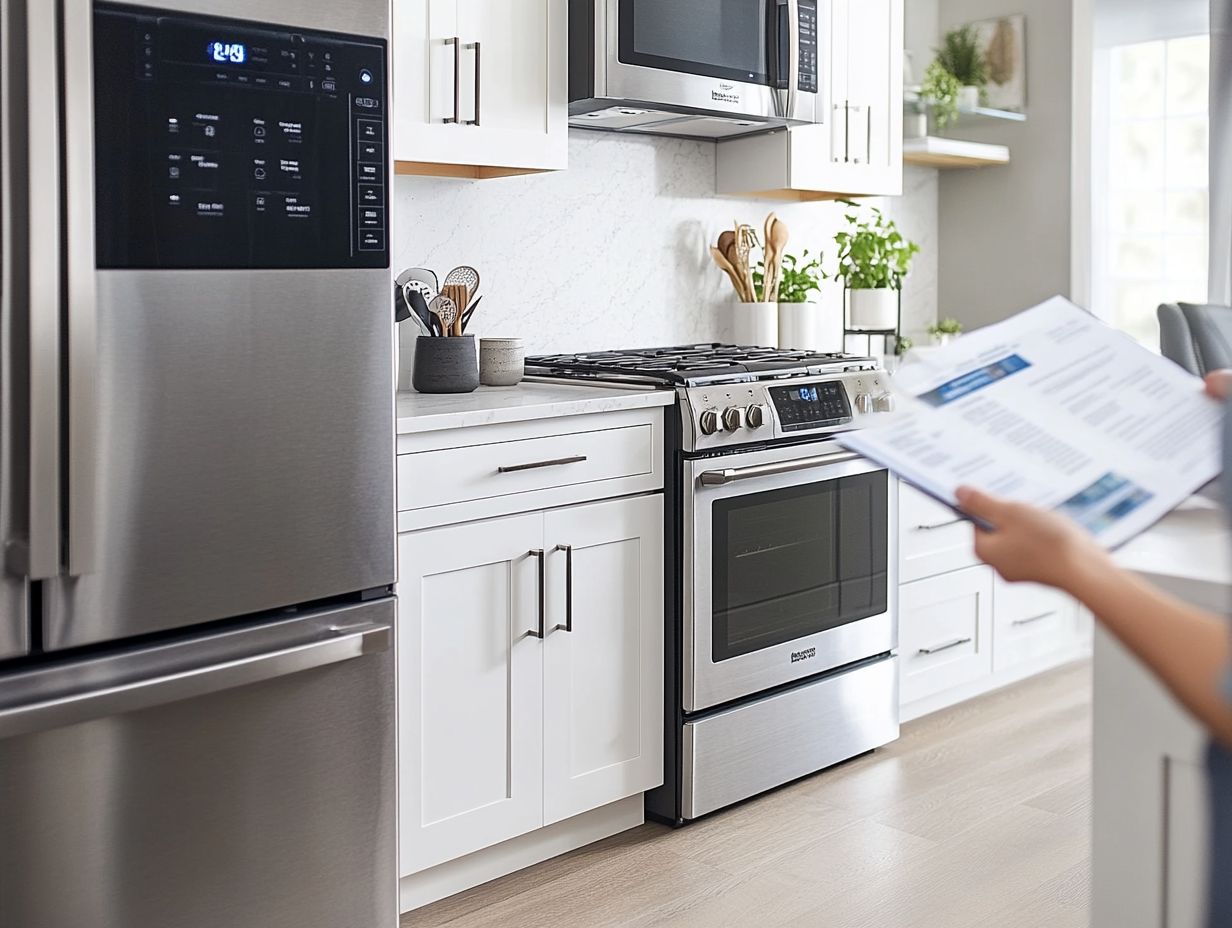
Financial incentives like government programs, rebates, and federal tax credits can cut the costs of energy-efficient appliances. This makes them more accessible for households looking to save on energy bills.
Government Programs and Rebates
Government programs and rebates play a crucial role in encouraging the adoption of energy-efficient appliances. They provide financial assistance to eligible households, helping to lower the initial costs associated with purchasing eco-friendly products.
These initiatives not only promote long-term energy savings but also lead to reduced utility bills over time.
Various programs are available at both federal and state levels, offering rebates, tax credits, and direct grants to support your greener choices. For instance, the ENERGY STAR program rewards you for purchasing qualifying appliances, while local utilities may offer additional rebates for your energy-efficient upgrades.
Eligibility often depends on factors like income level, appliance type, and geographical location, ensuring that those in greatest need can fully benefit from these financial options.
Check out these programs today!
Cost Savings in the Long Run
Investing in energy-efficient appliances may involve higher initial costs. However, the long-term energy savings can significantly reduce your overall household expenses.
Over time, these appliances can dramatically lower your energy bills by consuming less electricity and water. This translates to tangible financial benefits.
For example, certified models typically use 10 to 50 percent less energy than standard options, making them a smart choice for eco-conscious homeowners.
Many consumers find they recover their initial investment within just a few years, thanks to lower monthly utility costs.
This return on investment not only enhances financial stability but also supports a more sustainable lifestyle, aligning personal savings with broader environmental goals.
Watch this video to learn more about energy-efficient appliances.
Frequently Asked Questions
How do I know if it’s time to upgrade to energy-efficient appliances?
If your current appliances are over 10 years old, require frequent repairs, or have low energy usage compared to newer models, it may be time to consider an upgrade to understand the environmental impact of energy-efficient appliances.
What are the benefits of upgrading to energy-efficient appliances?
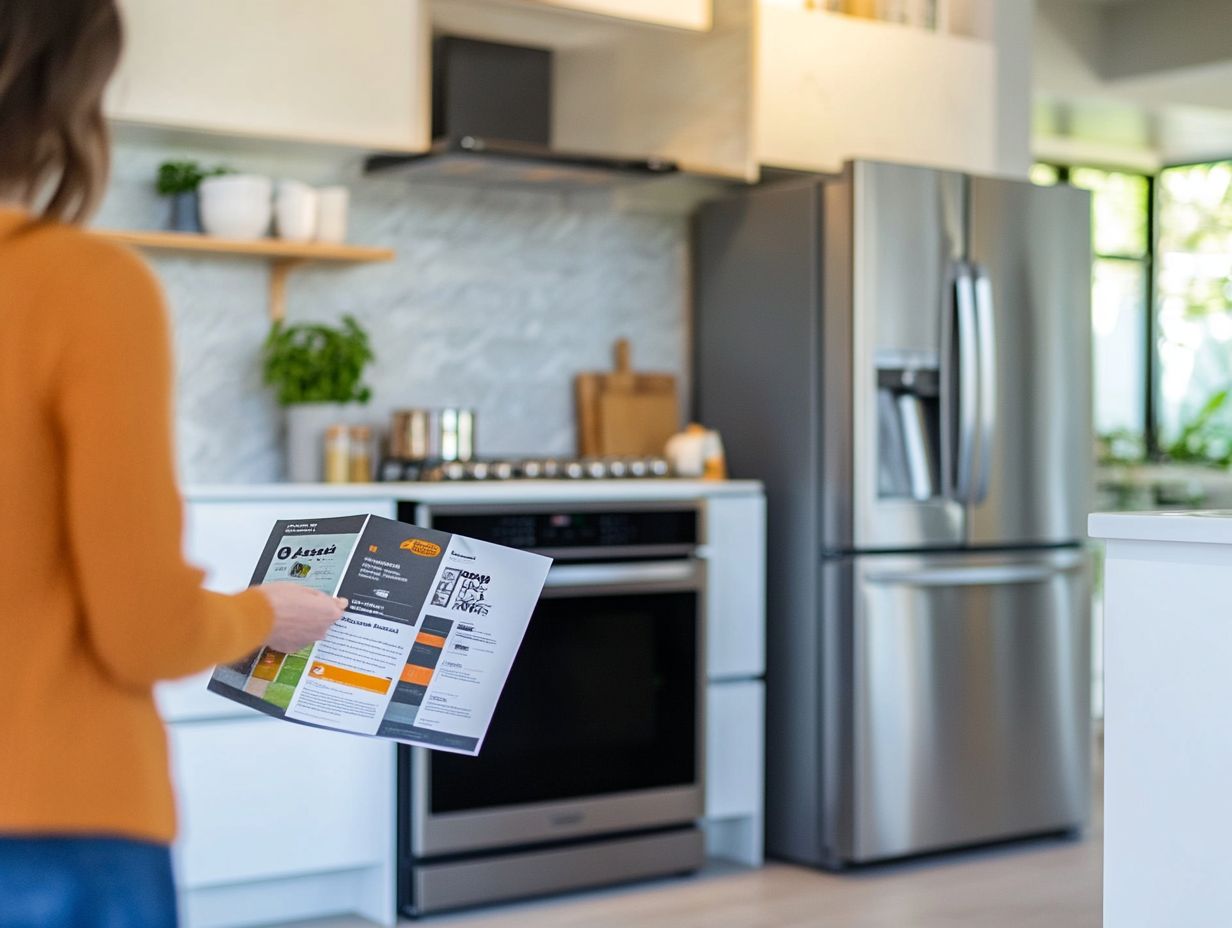
Upgrading to energy-efficient appliances can save you money on utility bills, reduce your carbon footprint, and potentially qualify you for rebates or tax credits.
How do I choose the right energy-efficient appliances for my home?
Start by researching the energy usage of different models and brands. Look for the ENERGY STAR label and consider the size and features that fit your needs. Consulting with a professional can also provide personalized recommendations.
Are energy-efficient appliances more expensive?
While the upfront cost of energy-efficient appliances may be higher, long-term savings on utility bills and potential rebates or tax credits can make them a more economical choice.
Can I upgrade to energy-efficient appliances if I live in a rental property?
This depends on your rental agreement. If you have your landlord’s permission, you can upgrade to energy-efficient small appliances at your own expense. You might also suggest this idea to your landlord to negotiate a rent reduction or other incentives for the upgrade.
What are some other ways to make my home more energy-efficient?
In addition to upgrading to energy-efficient appliances, you can enhance your home’s insulation, replace old windows with more efficient ones, and switch to LED light bulbs. Additionally, following top tips for maintaining energy-efficient appliances can further optimize your energy savings. Remember to unplug electronics when not in use and adjust your thermostat to save energy.

